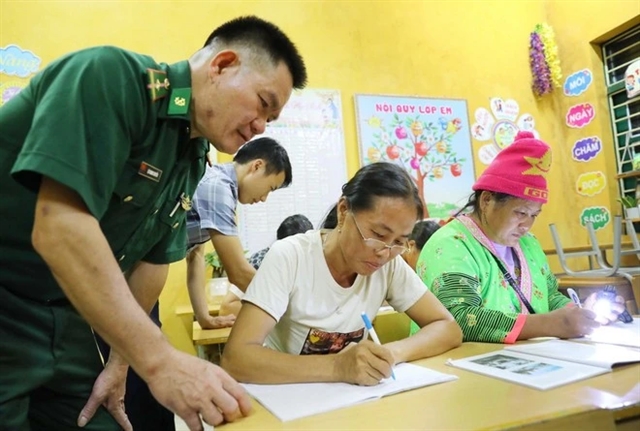 |
| Lieutenant Lò Thanh Chuyển of the Leng Su Sìn Border Guard Station assists teachers in a class in Cà Nà Pá Village in Điện Biên Province. VNA/VNS Photo |
HÀ NỘI - Deputy Prime Minister Lê Thành Long has approved a programme to enhance learning in ethnic minority and mountainous areas.
He signed Decision No. 1716/QĐ-TTg, for the project to expand the capacity and effectiveness of community learning centres in those areas, with a vision to 2030.
The programme aims to revolutionise the organisation of educational activities at community learning centres in these regions. By 2030, it seeks to provide high-quality literacy classes for those who can't read or write and update skills and knowledge through technology transfer.
These efforts aim to improve literacy, create jobs, increase incomes and foster economic growth and advance social progress, while building a lifelong learning society.
The programme’s objectives include ensuring that all community learning centres are staffed with sufficient personnel and equipped with dedicated offices or operating spaces, complete with internet-connected computers. It also aims to provide at least 90 per cent of centres with libraries or book collections, along with free internet and Wi-Fi access to support learners.
Training will be provided for all managers, teachers and trainers to strengthen their capacity in managing and organising educational activities. Furthermore, all centres will adopt educational materials tailored to learners’ needs, integrating knowledge and technology transfer.
Annually, the programme targets at least 10.5 per cent of individuals aged 15–60 who are illiterate to join Phase 1 literacy programmes, with 2 per cent advancing to Phase 2 after completing Phase 1. It also aspires to achieve a minimum annual increase of 5 per cent in the number of individuals aged 15–60 participating in tailored educational programmes at community centres.
Additionally, at least 90 per cent of centres are expected to use IT for governance and education, achieving basic proficiency or higher. The goal is for at least 80 per cent of centres or institutions tasked with literacy programmes to use electronic resources and lessons, enabling learners to access education anytime, anywhere.
To achieve these goals, the programme outlines several key strategies. It will focus on raising awareness and strengthening leadership for community learning centres, improving policies and mechanisms supporting these centres, and enhancing capacity and effectiveness in executing educational programmes. It will also mobilise resources and integrate IT into the management and educational activities of the centres while establishing model centres to serve as benchmarks.
The Prime Minister has assigned the Ministry of Education and Training to take the lead in coordinating and directing the implementation of the programme. VNS

